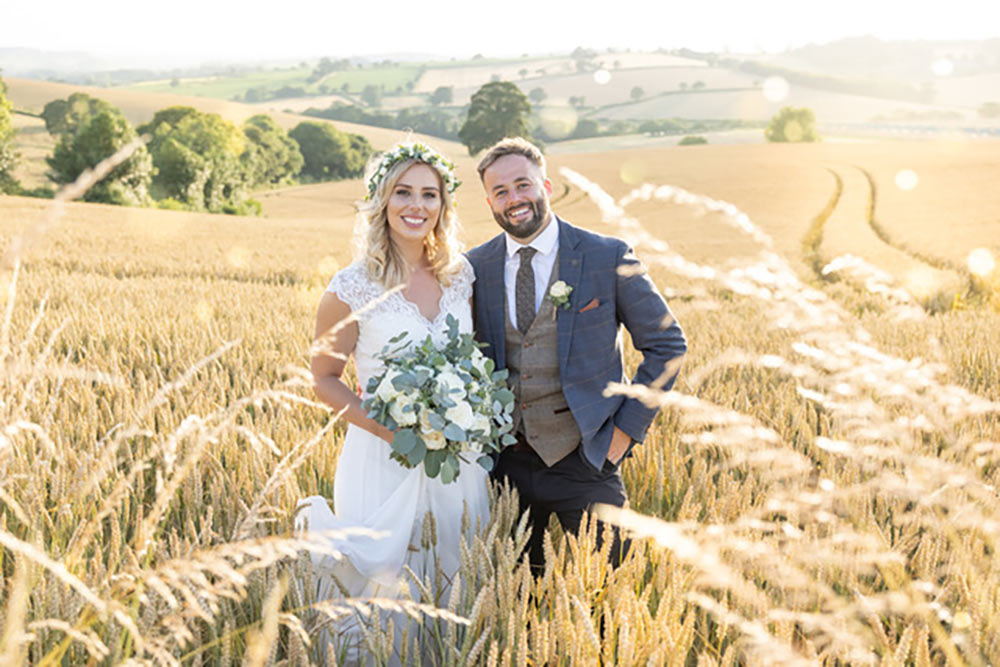Whether it's in the stressed-out run-up or during the actual day of 'I dos', the butterflies-in-the-belly reference is, it seems, as traditional as everything else.

It is, of course, a completely normal feeling. But one that if left to fester can cause some distress not only for the individual, but for their other close relationships, from their 'maids and mothers to dearly betrothed.
Reported to be one of the biggest sources of anxiety, angst and even argument, pre-wedding nerves can be extremely challenging to cope with, completely hampering what should otherwise be a period of excitement, anticipation and joy.
And, with the whole spectrum of wedding day sentiments spilling into married life, it doesn't bode well in the early throes of matrimony if one or both partners are failing to curb their emotionally frayed edges.
Keen to deconstruct the phenomenon and offer some nerve-busting advice to those heading toward the aisle, I embarked upon my own mini modern day psychological pilgrimage by discovering the world of mindfulness.
"I first came to mindfulness travelling in the Himalayas in the late 1980s", reveals Vici Williams of Mindfulness Cornwall. "Mindfulness practice and study has been a personal journey ever since."
Having completed her postgraduate mindfulness training, Vici has been fully engaged with the practices while using them to help others overcome a plethora of problems.
"I have been able to integrate what I have found so valuable personally with my work, being able to pass it on to support and enable others to find new ways 'to be' in their lives," she explains.
So, what exactly is mindfulness and how can it help couples to banish their wedding nerves?
Mindfulness founder Jon Kabat-Zinn defines it in the following way: "The term mindfulness refers to a quality of awareness that includes that ability to pay attention in a particular way: on purpose, in the present moment and non-judgmentally."
Vici elaborates: "Mindfulness is about coming to know ourselves to bring understanding and compassion to all that we are through cultivating awareness and insight through mindfulness practice."
"Mindfulness practice offers ways of settling and stilling the mind which enables opportunity for responding to the challenges that arise in our lives, rather than following habitual reactive patterns that often cause us and others distress."
In short, altering our perspective and rooting ourselves in the present through a combination of meditative and cognitive style approaches allows a calmer, more balanced and healthy mindset.
Daily practices will normalise these feelings, expel negatives such as nerves and strengthen our bonds with each other and the world as a whole.
Combining ancient wisdom with modern psychology in a healthcare setting, mindfulness can take several forms (MBSR - Mindfulness-Based Stress Reduction, or MBCT - Mindfulness-Based Cognitive Therapy) and can be used to help combat everything from depression and insomnia to hypertension and chronic pain.
And since the basic tenants of mindfulness and marriage are similar - understanding, benevolence, clarity of communication and self-expression - they make for a truly unique coupling.
Vici explains how it can be utilised to help establish a strong and successful relationship. "Mindfulness offers ways of relating to ourselves, and to others with greater awareness imbued with qualities of kindness, patience and from a place of understanding. This can support us in all relationships."
Like marriage, mindfulness "is a practice that needs regular tending and care," continues Vici. "It is best supported by maintaining a regular daily mindfulness practice and integrating mindfulness through the day, using routine daily activities as reminders and opportunities to bring ourselves back into present moment awareness."
Whether you wish to embark upon a guided journey, introductory course or couple's session of mindfulness to abate tension and nerves, or you're simply seeking a moment of calm during the wedding whirlwind, the brilliance of mindfulness is that anyone can achieve it, anywhere.
"I'd recommend formal training," advises Vici. "But also using methods to ground, for example, sensations of contact, pressure and touch through the feet. People may also explore coming to the breath to help settle and steady. Both of these methods can be helpful when emotions are strong or thoughts are busy."
I have to admit that talking to Vici and trying some of her methods myself definitely helped me to refocus my thoughts, relax, and increase my awareness of things I'd been taking for granted or had deemed beyond my control - including negative thought patterns.
The results were rapid and surprisingly effortless, as after just a single session I'd learned some vital grounding techniques while exploring the topography of my own psychological landscape.
With one of the biggest changes and most emotional periods in your life looming large on the horizon of your own psyche - however it may look or feel - I'd definitely suggest sampling some mindfulness.
Mindfulness Cornwall is a Community Interest Company that runs a range of mindfulness courses and therapy.
Visit www.mindfulnesscornwall.co.uk for more information.

KEEP CALM AND CARRY ON
Try these mindfulness exercises to incorporate into your everyday - and wedding day - to stay fully engaged in the moment
Breathing
Stand or sit anywhere and focus on your breath for one minute. Breathe in and out slowly, holding your breath for six seconds once inhaled, then relax and exhale. 'Watch' your breath with all of your senses and keep returning to it as you release all of your other thoughts.
Observation
Find a space in the natural world, for example your garden or a beach, and focus on a single organism such as an insect, flower or bird. Look at it avidly as if it's the first time you have seen it and focus on that one thing as you strengthen your connection to the natural world.
Feeling
Accentuating your awareness is a key component of mindfulness. Pick something that happens every day on more than one occasion and consciously engage with it. Slow down and take a mindful moment to be thankful for your meal or appraise your ability to climb the stairs/walk the dog/take a shower as you linger in the present moment of deep appreciation.
Listening
Mindful listening removes judgement and affords a more neutral, 'now' awareness. Listen to a song that you haven't heard before and lose yourself to the melody as you explore its unique sound, or tune into the sounds of your environment and concentrate on new ones as you slowly sink into the sensory experience.
words Hannah May
Copyright Wed magazine 2015






.jpg)






.png)
.jpg)